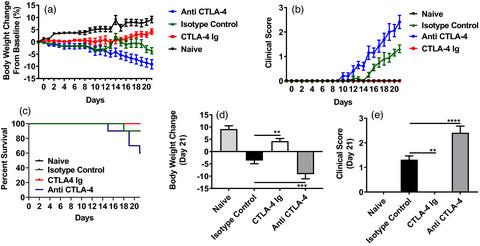当前位置:
X-MOL 学术
›
Clin. Exp. Immunol.
›
论文详情
Our official English website, www.x-mol.net, welcomes your
feedback! (Note: you will need to create a separate account there.)
Cytotoxic T lymphocyte antigen-4 regulates development of xenogenic graft versus host disease in mice via modulation of host immune responses induced by changes in human T cell engraftment and gene expression
Clinical & Experimental Immunology ( IF 3.4 ) Pub Date : 2021-09-06 , DOI: 10.1111/cei.13659 Chunxu Gao 1 , Debra Gardner 1 , Marie-Clare Theobalds 1 , Shannon Hitchcock 1 , Heather Deutsch 1 , Chidozie Amuzie 2 , Matteo Cesaroni 3 , Davit Sargsyan 4 , Tadimeti S Rao 1 , Ravi Malaviya 1
Clinical & Experimental Immunology ( IF 3.4 ) Pub Date : 2021-09-06 , DOI: 10.1111/cei.13659 Chunxu Gao 1 , Debra Gardner 1 , Marie-Clare Theobalds 1 , Shannon Hitchcock 1 , Heather Deutsch 1 , Chidozie Amuzie 2 , Matteo Cesaroni 3 , Davit Sargsyan 4 , Tadimeti S Rao 1 , Ravi Malaviya 1
Affiliation

|
Graft versus host disease (GvHD) is a major clinical problem with a significant unmet medical need. We examined the role of cytotoxic T lymphocyte antigen-4 (CTLA-4) in a xenogenic GvHD (xeno-GvHD) model induced by injection of human peripheral mononuclear cells (hPBMC) into irradiated non-obese diabetic (NOD) SCID gamma (NSG) mice. Targeting the CTLA-4 pathway by treatment with CTLA-4 immunoglobulin (Ig) prevented xeno-GvHD, while anti-CTLA-4 antibody treatment exacerbated the lethality and morbidity associated with GvHD. Xeno-GvHD is associated with infiltration of hPBMCs into the lungs, spleen, stomach, liver and colon and an increase in human proinflammatory cytokines, including interferon (IFN)-γ, tumor necrosis factor (TNF)-α and interleukin (IL)-5. Infiltration of donor cells and increases in cytokines were attenuated by treatment with CTLA-4 Ig, but remained either unaffected or enhanced by anti-CTLA-4 antibody. Further, splenic human T cell phenotyping showed that CTLA-4 Ig treatment prevented the engraftment of human CD45+ cells, while anti-CTLA-4 antibody enhanced donor T cell expansion, particularly CD4+ (CD45RO+) subsets, including T box transcription factor TBX21 (Tbet)+ CXCR3+ and CD25+ forkhead box protein 3 (FoxP3) cells. Comprehensive analysis of transcriptional profiling of human cells isolated from mouse spleen identified a set of 417 differentially expressed genes (DEGs) by CTLA-4 Ig treatment and 13 DEGs by anti-CTLA-4 antibody treatment. The CTLA-4 Ig regulated DEGs mapped to down-regulated apoptosis, inflammasome, T helper type 17 (Th17) and regulatory T cell (Treg) pathways and enhanced Toll-like receptor (TLR) receptor signaling, TNF family signaling, complement system and epigenetic and transcriptional regulation, whereas anti-CTLA-4 antibody produced minimal to no impact on these gene pathways. Our results show an important role of co-inhibitory CTLA-4 signaling in xeno-GvHD and suggest the therapeutic utility of other immune checkpoint co-inhibitory pathways in the treatment of immune-mediated diseases driven by hyperactive T cells.
中文翻译:

细胞毒性 T 淋巴细胞抗原 4 通过调节人类 T 细胞植入和基因表达变化诱导的宿主免疫反应来调节小鼠异种移植物抗宿主病的发展
移植物抗宿主病 (GvHD) 是一个重大的临床问题,医疗需求未得到满足。我们检查了细胞毒性 T 淋巴细胞抗原 4 (CTLA-4) 在异种 GvHD (xeno-GvHD) 模型中的作用,该模型通过将人外周单核细胞 (hPBMC) 注射到受照射的非肥胖糖尿病 (NOD) SCID 伽马 (NSG) 中诱导) 老鼠。通过用 CTLA-4 免疫球蛋白 (Ig) 治疗靶向 CTLA-4 通路可预防异种 GvHD,而抗 CTLA-4 抗体治疗加剧了与 GvHD 相关的致死率和发病率。Xeno-GvHD 与 hPBMC 浸润到肺、脾、胃、肝和结肠以及人类促炎细胞因子增加相关,包括干扰素 (IFN)-γ、肿瘤坏死因子 (TNF)-α 和白细胞介素 (IL)- 5. 供体细胞的浸润和细胞因子的增加被 CTLA-4 Ig 治疗减弱,但抗 CTLA-4 抗体不受影响或增强。此外,脾脏人 T 细胞表型显示 CTLA-4 Ig 治疗阻止了人 CD45 的植入+细胞,而抗 CTLA-4 抗体增强供体 T 细胞扩增,特别是 CD4 + (CD45RO + ) 亚群,包括 T 盒转录因子 TBX21 (Tbet) + CXCR3 +和 CD25 +叉头盒蛋白 3 (FoxP3) 细胞。对从小鼠脾脏分离的人类细胞的转录谱进行综合分析,通过 CTLA-4 Ig 处理确定了一组 417 个差异表达基因 (DEG),通过抗 CTLA-4 抗体处理确定了 13 个 DEG。CTLA-4 Ig 调节的 DEGs 映射到下调的细胞凋亡、炎症小体、17 型 T 辅助细胞 (Th17) 和调节性 T 细胞 (T reg) 通路和增强的 Toll 样受体 (TLR) 受体信号、TNF 家族信号、补体系统以及表观遗传和转录调节,而抗 CTLA-4 抗体对这些基因通路产生的影响很小甚至没有。我们的结果显示了共抑制 CTLA-4 信号在异种 GvHD 中的重要作用,并表明其他免疫检查点共抑制途径在治疗由过度活跃的 T 细胞驱动的免疫介导疾病中的治疗效用。
更新日期:2021-09-06
中文翻译:

细胞毒性 T 淋巴细胞抗原 4 通过调节人类 T 细胞植入和基因表达变化诱导的宿主免疫反应来调节小鼠异种移植物抗宿主病的发展
移植物抗宿主病 (GvHD) 是一个重大的临床问题,医疗需求未得到满足。我们检查了细胞毒性 T 淋巴细胞抗原 4 (CTLA-4) 在异种 GvHD (xeno-GvHD) 模型中的作用,该模型通过将人外周单核细胞 (hPBMC) 注射到受照射的非肥胖糖尿病 (NOD) SCID 伽马 (NSG) 中诱导) 老鼠。通过用 CTLA-4 免疫球蛋白 (Ig) 治疗靶向 CTLA-4 通路可预防异种 GvHD,而抗 CTLA-4 抗体治疗加剧了与 GvHD 相关的致死率和发病率。Xeno-GvHD 与 hPBMC 浸润到肺、脾、胃、肝和结肠以及人类促炎细胞因子增加相关,包括干扰素 (IFN)-γ、肿瘤坏死因子 (TNF)-α 和白细胞介素 (IL)- 5. 供体细胞的浸润和细胞因子的增加被 CTLA-4 Ig 治疗减弱,但抗 CTLA-4 抗体不受影响或增强。此外,脾脏人 T 细胞表型显示 CTLA-4 Ig 治疗阻止了人 CD45 的植入+细胞,而抗 CTLA-4 抗体增强供体 T 细胞扩增,特别是 CD4 + (CD45RO + ) 亚群,包括 T 盒转录因子 TBX21 (Tbet) + CXCR3 +和 CD25 +叉头盒蛋白 3 (FoxP3) 细胞。对从小鼠脾脏分离的人类细胞的转录谱进行综合分析,通过 CTLA-4 Ig 处理确定了一组 417 个差异表达基因 (DEG),通过抗 CTLA-4 抗体处理确定了 13 个 DEG。CTLA-4 Ig 调节的 DEGs 映射到下调的细胞凋亡、炎症小体、17 型 T 辅助细胞 (Th17) 和调节性 T 细胞 (T reg) 通路和增强的 Toll 样受体 (TLR) 受体信号、TNF 家族信号、补体系统以及表观遗传和转录调节,而抗 CTLA-4 抗体对这些基因通路产生的影响很小甚至没有。我们的结果显示了共抑制 CTLA-4 信号在异种 GvHD 中的重要作用,并表明其他免疫检查点共抑制途径在治疗由过度活跃的 T 细胞驱动的免疫介导疾病中的治疗效用。











































 京公网安备 11010802027423号
京公网安备 11010802027423号